Life Infotech now a leading brand in the field of technology training & its invites students around the nation to be a part of the Training Program. It gives us immense pleasure to introduce Life Infotech leading Training Company. Life Infotech invites B.Tech, BE,(All Branch) & MCA, BCA, MBA(IT) and MBA-Finance, HR,Marketing students for Training at Lucknow. Training provides the students with the advantage of gaining real-world experience. When the students will be facing their first job interviews summer training is the most important experience that is taken into account. During the tenure of summer training students are exposed with the actual organizational culture of an environment and also with industrial projects. They can get to learn about the practical aspects of implementation like coding, decoding, programming, debugging, configuration, installation, administration, designing skills under the guidance and mentorship of industrial experts and trainers.
Computer | PHP | NET | JAVA | c/C++ | Wordpress | Shivakant Gupta| wordpress | joomla | hosting | domain
Sunday, 10 July 2022
Life Infotech Web Design, Development, Software Development, Android Development Languages and SEO Summer Training & Internship
Web Design, Development, Software Development, Android Development Languages and SEO Summer Training & Internship
PHP
Core Java
Mysql
Php Framework Codigniter
HTML5 & CSS3
Bootstrap
JavaScript
Jquery
Ajax & JSON
AngularJS
NodeJS
digital marketing
web design
web development
Project Guidelines
Project as per your choice
Internship Certificate
Graphic Design & Video Editing Software's Summer Training & Internship
Adobe Photoshop
Adobe Illustrator
CorelDraw
Adobe InDesign
Adobe Lightroom
Adobe Premiere
Adobe After Effects
Project Guidelines
Project as per your choice
Internship Certificate
Architect's Software's Summer Training & Internship
Who We Are?
Life Infotech IT Solution is Rated No. 1 Website and App Development and IT Company in Lucknow, Uttarpradesh, India. We delivered 1000+ projects successfully in last 10 years for clients from all over India and over 10+ cities including Lucknow, Delhi,unnao,Sitapur,Raebareli Prayagraj (Allahabad), Mumbai etc. Our work portfolio includes Websites Design & Development, MLM Website, E-Commerce ,Logo and Scoial Media Social media Promotion.
Life Infotech was founded in 2011 ,with the mission of "Technology that Add Value to Business and Society" Life Infotech is a dynamic new generation Website/Software solution as well as Networking Product Development company. Thecompany develops markets, sells and supports Software Products, Websites and Network Projects ,Web Hosting ,Domain Name, Bulk SMS for National and International.. Life InfotechProvides Corporate and Certification Training Programs as also provide Programming services,Designing & Printing, Application Development services, Search Engine Optimization (SEO) and Back-Office Services, Hardware & Maintenance Sales & Service.Our mission is to enhance efficiency, productivity and capability of businesses by delivering the services above & beyond industry values and customer expectations.
Life InfoTech IT Solution strength lies in offering client oriented solutions which are highly reliable. Life InfoTech IT Solution, an Indian company, is the leading Information Technology Consulting, Services, and Business Process.Outsourcing Organization that envisioned and instigated the adoption of the flexible business practices that today enable companies to operate more efficiently and produce more value. We are into Software Development, Web Services, IT Education, Graphics & Multimedia and IT Security Solutions. Emphasis on introducing key technology solutions to meet the dynamic needs of business environment.
https://lifeinfotech.in/about.php
Welcome to Life Infotech IT Solution
Life Infotech IT Solution is Rated No. 1 Website and App Development and IT Company in Lucknow, Uttarpradesh, India. We delivered 1000+ projects successfully in last 10 years for clients from all over India and over 10+ cities including Lucknow, Delhi,unnao,Sitapur,Raebareli Prayagraj (Allahabad), Mumbai etc. Our work portfolio includes Websites Design & Development, MLM Website, E-Commerce ,Logo and Scoial Media Social media Promotion.
Life Infotech was founded in 2011 ,with the mission of "Technology that Add Value to Business and Society" Life Infotech is a dynamic new generation Website/Software solution as well as Networking Product Development company. Thecompany develops markets, sells and supports Software Products, Websites and Network Projects ,Web Hosting ,Domain Name, Bulk SMS for National and International.. Life InfotechProvides Corporate and Certification Training Programs as also provide Programming services,Designing & Printing, Application Development services, Search Engine Optimization (SEO) and Back-Office Services, Hardware & Maintenance Sales & Service.Our mission is to enhance efficiency, productivity and capability of businesses by delivering the services above & beyond industry values and customer expectations.
Life InfoTech IT Solution strength lies in offering client oriented solutions which are highly reliable. Life InfoTech IT Solution, an Indian company, is the leading Information Technology Consulting, Services, and Business Process.Outsourcing Organization that envisioned and instigated the adoption of the flexible business practices that today enable companies to operate more efficiently and produce more value. We are into Software Development, Web Services, IT Education, Graphics & Multimedia and IT Security Solutions. Emphasis on introducing key technology solutions to meet the dynamic needs of business environment.
Our Office Location
Amity University Rd, Near Satya Narayan HP Petrol Pump,Gomti Nagar,Lucknow,
Uttar Pradesh 226010.
Contact Number
+91-7905079440
+91-9889332475
+91-8542057751
+91-8318893158
Email Address
info@lifeinfotech.in
sgupta276@gmail.com
lifeinfotechgroup@gmail.com
Friday, 8 April 2022
Submission of the Project Report to DOEACC
Submission of the Project Report to DOEACC | ||
| ||
Acknowledgement | ||
| Certificate of the project guide / Center Manager Annexure III Certificate of the Company / Organization ( for direct candidates). Synopsis of the Project - B & C level only. Main Report - Objective & Scope of the Project. - Theoretical Background - Definition of Problem - System Analysis & Design vis-�-vis User Requirements - System Planning (PERT Chart) - Methodology adopted, System Implementation & Details of Hardware & Software used. - System Maintenance & Evaluation - Cost and benefits Analysis. - Detailed Life Cycle of the Project - ERD, DFD - Input and Output Screen Design - Process involved - Methodology used for testing - Test Report, Printout of the Report, Printout of the Code Sheet. - User / Operational Manual - including security aspects, access rights, back up, controls, etc Annexure: 1. Brief background of the organization where the student has developed the project. 2. Data Dictionary. -- This should give a catalogue of the data elements used in the system / sub system developed. -- The following are the details required. Write NA if NOT applicable: -- a Data Name -- b Aliases if any -- c Length ( size ) -- d Type, Numeric , Alpha, Binary etc. 3. List of abbreviations, Figures, Tables. 4.Reference -- Bibliography -- Website 5. Soft copy of the project on CD / Floppy. |
DOEACC Project Synopsis Project Synopsis
Project Synopsis | ||
| ||
Time of Submission of 'B' Level Project | ||
| Topic of the Project This should be explicitly mentioned at the beginning of the Synopsis. Since the topic itself gives a peep into the project to be taken up, candidate is advised to be prudent on naming the project. This being the overall impression on the future work, the topic should corroborate the work. Objective and Scope This should give a clear picture of the project. Objective should be clearly specified. What the project ends up to and in what way this is going to help the end user has been mentioned. Process Description The process of the whole software system proposed, to be developed, should be mentioned in brief. This may be supported by DFD's / Flowcharts to explain the flow of the information. Resources and Limitations The requirement of the resources for designing and developing the proposed system must be given. the resources might be in form of the hardware / software or the data from the industry. The limitations of the proposed system in respect of a larger and comprehensive system must be given. Conclusion The write-up must end with the concluding remarks-briefly describing innovations in the approach for implementing the Project, main achievements and also any other important feature that makes the system stand out from the rest. Communication of Approval of Synopsis After finalizing the topic and the selection of the guide, students should send the Project Proposal Performa along with the Synopsis and bio-data of the guide to the DOEACC Society. Incomplete Proposal in any respect will be straightway rejected. A written communication regarding the approval / non approval of the Project Proposal will be sent to the candidate within six weeks of the receipt of the proposal in the Society. In case of non-approval, the suggestions for reformulating the project will be communicates. Revised Project Synopsis Performa should be resubmitted along with a copy of the earlier synopsis and Project Synopsis Performa bearing the number given earlier by DOEACC and comments of the evaluator. Some important notes while preparing the project proposal The following suggested guidelines may be followed in preparing the Final Project report. Good quality white executive bond paper A4 size should be used for typing and duplication. Care should be taken to avoid smudging while duplicating the copies. Page Specification :( Written paper and source code ) Left Margin 3.0 cms Right Margin 3.0 cms Top Margin 2.7 cms Bottom Margin 2.7 cms Page numbers - All text pages as well as Program source code listing should be numbered at the bottom centre of the pages. |
Saturday, 29 January 2022
Word shortcut keys computer
A computer short cut keys function quickly and make your work easy.
Word shortcut keys
- Ctrl + A -- Select all contents of the page.
- Ctrl + B -- Bold highlighted selection.
- Ctrl + C -- Copy selected text.
- Ctrl + X -- Cut selected text.
- Ctrl + N -- Open new/blank document.
- Ctrl + O -- Open options.
- Ctrl + P -- Open the print window.
- Ctrl + F -- Open find box.
- Ctrl + I -- Italicise highlighted selection.
- Ctrl + K -- Insert link.
- Ctrl + U -- Underline highlighted selection.
- Ctrl + V -- Paste.
- Ctrl + Y -- Redo the last action performed.
- Ctrl + Z -- Undo last action.
- Ctrl + G -- Find and replace options.
- Ctrl + H -- Find and replace options.
- Ctrl + J -- Justify paragraph alignment.
- Ctrl + L -- Align selected text or line to the left.
- Ctrl + Q -- Align selected paragraph to the left.
- Ctrl + E -- Align selected text or line to the center.
- Ctrl + R -- Align selected text or line to the right.
- Ctrl + M -- Indent the paragraph.
- Ctrl + T -- Hanging indent.
- Ctrl + D -- Font options.
- Ctrl + Shift + F -- Change the font.
- Ctrl + Shift + > -- Increase selected font +1.
- Ctrl + ] -- Increase selected font +1.
- Ctrl + [ -- Decrease selected font -1.
- Ctrl + Shift + * -- View or hide non printing characters.
- Ctrl + (Left arrow) -- Move one word to the left.
- Ctrl + (Right arrow) -- Move one word to the right.
- Ctrl + (Up arrow) -- Move to the beginning of the line or paragraph.
- Ctrl + (Down arrow) -- Move to the end of the paragraph.
- Ctrl + Del -- Delete word to the right of the cursor.
- Ctrl + Backspace -- Delete word to the left of the cursor.
- Ctrl + End -- Move cursor to end of the document.
- Ctrl + Home -- Move cursor to the beginning of the document.
- Ctrl + Space -- Reset highlighted text to default font.
- Ctrl + 1 -- Single-space lines.
- Ctrl + 2 -- Double-space lines.
- Ctrl + 5 -- 1.5-line spacing.
- Ctrl + Alt + 1 Change text to heading 1.
- Ctrl + Alt + 2 Change text to heading 2.
- Ctrl + Alt + 3 Change text to heading 3.
- F1 -- Open help.
- Shift + F3 -- Change case of selected text.
- Shift + Insert -- Paste.
- F4 -- Repeat the last action performed (Word 2000+).
- F7 -- Spell check selected text and/or document.
- Shift + F7 -- Activate the thesaurus.
- F12 -- Save as.
- Ctrl + S -- Save.
- Shift + F12 -- Save.
- Alt + Shift + D -- Insert the current date.
- Alt + Shift + T -- Insert the current time.
- Ctrl + W -- Close document.
- F2 -- Edit the selected cell.
- F5 -- Go to a specific cell.
- F7 -- Spell check selected text and/or document.
- F11 -- Create chart
- Ctrl + Shift + ; -- Enter the current time.
- Ctrl + ; -- Enter the current date
- Alt + Shift + F1 -- Insert new worksheet.
- Shift + F3 -- Open the Excel formula window.
- Shift + F5 -- Bring up the search box
- Ctrl + A -- Select all contents of a worksheet.
- Ctrl + B -- Bold highlighted selection.
- Ctrl + I -- Italicize highlighted selection.
- Ctrl + C -- Copy selected text.
- Ctrl + V -- Paste
- Ctrl + D -- Fill
- Ctrl + K -- Insert link
- Ctrl + F -- Open find and replace options.
- Ctrl + G -- Open go-to options.
- Ctrl + H -- Open find and replace options.
- Ctrl + U -- Underline highlighted selection.
- Ctrl + Y -- Underline selected text.
- Ctrl + 5 -- Strikethrough highlighted selection.
- Ctrl + O -- Open options.
- Ctrl + N -- Open new document.
- Ctrl + P -- Open print dialog box.
- Ctrl + S -- Save.
- Ctrl + Z -- Undo last action.
- Ctrl + F9 -- Minimize current window.
List of basic computer shortcut keys:
- Alt + F--File menu options in the current program.
- Alt + E--Edits options in the current program.
- F1--Universal help (for any sort of program).
- Ctrl + A--Selects all text.
- Ctrl + X--Cuts the selected item.
- Ctrl + Del--Cut selected item.
- Ctrl + C--Copy the selected item.
- Ctrl + Ins-- Copy the selected item.
- Ctrl + V--Paste the selected item.
- Shift + Ins -- Paste the selected item.
- Home -- Takes the user to the beginning of the current line.
- Ctrl + Home--Go to the beginning of the document.
- End -- Go to the end of the current line.
- Ctrl + End -- Go to the end of a document.
- Shift + Home -- Highlight from current position to beginning of the line.
- Shift + End -- Highlight from current position to end of the line.
- Ctrl + (Left arrow) -- Move one word to the left at a time.
- Ctrl + (Right arrow) -- Move one word to the right at a time.
- Alt + Tab -- Switch between open applications.
- Alt + Shift + Tab -- Switch backward between open applications.
- Alt + Print Screen -- Create screenshot for the current program.
- Ctrl + Alt + Del -- Reboot/Windows task manager.
- Ctrl + Esc -- Bring up the start menu.
- Alt + Esc -- Switch between applications on the taskbar.
- F2 -- Rename selected icon.
- F3 -- Start find from the desktop.
- F4 -- Open the drive selection when browsing.
- F5 -- Refresh contents.
- Alt + F4 -- Close current open program.
- Ctrl + F4 -- Close window in program.
- Ctrl + Plus Key-- Automatically adjust widths of all columns in Windows Explorer.
- Alt + Enter -- Open properties window of selected icon or program.
- Shift + F10 -- Simulate right-click on selected item.
- Shift + Del -- Delete programs/files permanently.
- Holding Shift During Boot up -- Boot safe mode or bypass system files.
- Holding Shift During Boot up -- When putting in an audio CD, will prevent CD Player from playing.
Sunday, 23 January 2022
Benefits of PHP training Course from Life Infotech:
Online and offline ,45 days / 6 months / 6 weeks of PHP and .net industrial training
Online and offline ,45 days / 6 months / 6 weeks of PHP and .net industrial training in Gomti Nagar Lcuknow Do you want to start your career as a Professional PHP Web Developer? Life Infotech provides professional PHP training in Lucknow up.
Phone : 7905079440,9889332475,8542057751
Website : www.lifeinfotech.in
Phone : 7905079440,9889332475,8542057751
Website : www.lifeinfotech.in
Best PHP and .net industrial training in Gomti Nagar Lucknow
Best PHP and .net industrial training in Gomti Nagar Lucknow
Life Infotech provides 45 days / 6 months / 6 weeks of PHP , .Net industrial training to meet the latest trends in PHP web development.Life Infotech training will give you the expertise you need in the latest technologies.
Phone : 7905079440,9889332475,8542057751
Website : www.lifeinfotech.in
Life Infotech available Online Classes for PHP , .Net training
Life Infotech available Online Classes for PHP , .Net training classes is now available in the online mode to ensure you can learn anytime, anywhere in india
Phone : 7905079440,9889332475,8542057751
Website : www.lifeinfotech.in
Life Infotech Provide Expert Faculty
Life Infotech Provide Expert Faculty designed web development best PHP ,.net training courses in Lucknow which are delivered by our expert faculty who come with good industry exposure.
Phone : 7905079440,9889332475,8542057751
Website : www.lifeinfotech.in
Who is eligible for PHP training classes?
Who is eligible for PHP training classes?
Our PHP web development best training course is available up with dedicated academies Lucknow is ideal for a Graduate with a technical bent of mind who wishes to become a skilled PHP full stack professional at a corporate, start-up or an agency. Those with existing knowledge of HTML, CSS, JavaScript, PHP and more can also pursue this course to upgrade their existing skills.Life infotech Admissions open winter for Best PHP and .Net training course in Full Stack Development in Online and Offline mode in available during the COVID Pandemic
Phone : 7905079440,9889332475,8542057751
Website : www.lifeinfotech.in
PHP and .Net development career
PHP and .Net development career with a php,.net developer course offered by Lifeinfotech from anywhere in Lucknow Gomti Nagar
Phone : 7905079440,9889332475,8542057751
Website : www.lifeinfotech.in
Admissions open for Best PHP and .Net training course
Admissions open for Best PHP and .Net training course in Full Stack Development in Online and Offline mode in available during the COVID Pandemic time
Phone : 7905079440,9889332475,8542057751
Website : www.lifeinfotech.in
Learn PHP and .Net to make dynamic websites and web applications
Learn PHP and .Net to make dynamic websites and web applications using PHP with our practice based PHP and MySQL training program to enable you with the coding fundamentals and latest updates join our course
Phone : 7905079440,9889332475,8542057751
Website : www.lifeinfotech.in
Join The Best PHP and .Net Training Course To Learn Industry-Centric Curriculum in Lucknow
Join The Best PHP and .Net Training Course To Learn Industry-Centric Curriculum in Lucknow
Phone : 7905079440,9889332475,8542057751
Website : www.lifeinfotech.in
best website development training institute in Lucknow
If you are looking for best website development training institute in Lucknow or website development course PHP and .Net in Lucknow.
Phone : 7905079440,9889332475,8542057751
Website : www.lifeinfotech.in
Saturday, 22 January 2022
Blog Tutorial
Blog Tutorial
A blog is a type of content that helps us to express and record our opinion, experience, and interest on the web. In blog posts, a writer or a group of writers share their views on a particular subject. Some most readable blogs are online magazines.
In our Blog tutorial, we are going to discuss the following topics -
- What is Blog?
- Why we use Blogs?
- History of Blogging
- Advantages of Blog
- Disadvantages of Blog
- How to start a blog
- Blogging tools
What is a Blog?
Blog or weblog is an online information delivering website, or we can say an online diary that regularly publishes new content. Generally, Blog contains a short informative article called "blog posts." The Blog posts typically include text, photos, videos, animated GIFs, and more other media. A Blog post can be accessed publicly or is made for private use, it entirely depends upon the blog owner.
Before learning Blog in-depth, let's understand the following terms related to blog -
What is blogging?
Blogging is the skill of writing content on a blog using internet tools. It provides the easiest way to keep our audience up-to-date and build trust with them.
What is a blogger?
Blogger is the person who creates, publishes, and maintains the blog for both personal and public use. The rank of a blog entirely depends upon the blogger.
Why we use Blogs?
Nowadays, everyone read blog posts, whether it is official news blog related to traditional news media, topic-based, related to hobbies, and based on entertainment.
Some essential use of blog posts are given below -
- A blog helps us start a new online business and, if we already have a business, then helps us to reach the target audience.
- It increases our experience in Search Engine Optimization (SEO) techniques, which helps us grow our business online.
- It helps us to enhance our business position in the industry.
- It helps us to increase customer engagement and organic traffic on our website.
- An effective, relevant, valuable, and informative blog posts help us to earn a lot of money.
- It is a great platform for us to branding and advertising the products.
- It helps us to collect feedback from the reader and improves our writing skills, and way of presenting our knowledge in front of the audience.
History of Blogging
Blog posts are now one of the most important parts of the digital world. Everyone takes an interest in reading and writing blogs based on people's success stories, media topics, entertainment, and current events. The blog covered a long journey to achieve success.
A brief history of the success of a blog post is discussed below -
The early stage of Blog (1994-1997)
In January 1994, Justin Hall created the first blog called links.net. It was a review of HTML examples that come across various online links.
In the same year, Claudio Pinhanez (Senior Manager at IBM) started to write short entries, called an "Open Diary."
In December 1997, Jorn Barger, the creator of website Robot Wisdom, introduced the term "weblog." The term weblog is a combination of two words "web," which is taken from the World Wide Web (www) and "log," which means written documentation.
More resources for bloggers (1998-2002)
In the year of October 1998, Open Diary becomes the most popular blogging platform. Open Diary was the first community membership model that allowed users of the community to give suggestions on the work of other community members.
In 1999, a programmer named Peter Merholz changed the name "Weblog" to "blog." Blogger, LiveJournal, and Xanga were also launched in this year.
In 2000, a large number of blogging platforms got started, including Boing Boing, Dooce, Gizmodo, Wonkette, and Huffington Post.
In February 2002, the first blog search engine "Technorati" was launched.
Mainstream is introduced (2003-2006)
In 2003, two blogging services, TypePad (used to hosts blogs for media organizations such as BCC) and WordPress (used to design and customized blog), were introduced to increase the number of bloggers.
Note: WordPress is the most popular Content Management System (CMS) in the world.
In the same year, Pressflex LLC launched the Blog Ads. After that, Google launched two products, AdSense and AdWords. These products allow us to integrate our blogs for the advertisement based on the relevance of the product.
In 2003, a live blogging activity "live text" has introduced, often used for sporting events.
In February 2004, video blogs (also called vlogs) introduced to gain popularity. Steve Garfield, a videographer, declared 2004 as a "year of the video blog."
In December 2004, Merriam-Webster declared "blog" as the "Word of the Year."
In February 2005, YouTube launched, which invited the audience to upload their videos.
In March 2005, a blogger named Garrett Graff provided first White House press credentials for his blog Fishbowl D.C. added credibility to blogging.
The Huffington Post (HuffPost) was also founded in the year 2005. It is an American web site that offers news, political forums, or group blogs with high-profile content.
A blog becomes a part of modern culture (2006-2008)
In 2006, microblogging has emerged with the introduction of Twitter. Twitter gained popularity due to its availability on social media. Twitter helps us to share stories, news, and other types of content within the smallest (140 characters) format.
In 2007, the first official microblogging platform, "Tumblr," was launched. Tumblr is a blogging platform that allows us to post content using multimedia objects.
Blogging Dark Ages (2009-2011)
In 2011, when the Google Panda algorithm was introduced, many blogs were rejected by Google due to the low-quality of the content.
Modern blogging (2012-till now)
In August 2012, a co-founder of Pyra Labs "Evan Williams" created the newest blogging platform, "Medium." Most of the users use Medium to write and publish their stories, ideas, informative content, and perspectives on current events.
In 2013, LinkedIn was launched. It allows fresher and professionals to share their opinions.
In 2016, blogging becomes more popular when WordPress started to add ".blog domain" extension to its blog URL.
Advantages of Blog
There are the following advantages of the blog -
1. Improved SEO & web traffic
A valuable, relevant, and informative content helps us to improve SEO ranking and bring more audience to our blog.
2. Help us to learn new technology
Writing and reading blog posts helps us to understand and learn new technology quickly. If we have been writing and reading a blog on a particular subject for a long time, our knowledge of a specific subject helps us research that subject.
The blog also helps us to learn video and photography skills. Using a blog, you can also learn web designing and programming languages such as HTML, PHP, MySQL, etc.
3. Helps us to improve writing skills
Writing blog posts help us to improve our writing skills and style. It also provides a way to learn new English words, spellings, use of punctuation, and sentence structure.
4. Improve our presentation skills
When we write content for our blog, we should always try to present content in an easy and good language that is easily understandable by our audience. Writing content for our audience in their understandable language helps us to improve our presentation skills that how we present our content in front of the audience.
5. Helps others to educate
As we all know, a blog is the best platform for students as well as working professionals to learn and enhance their knowledge. If we offer an informative blog to our audience, then we help them to learn technologies.
6. Promote businesses
Blog posts help us to promote both small as well as large businesses. Using blog posts, we can promote our business online and attract more visitors to our site.
7. Communicate with Worldwide Audience
Communicate with a worldwide audience is one of the biggest advantages of the blog. It provides an opportunity to meet a wider range of clients and build trust with worldwide audiences through high quality, relevant, valuable, and effective content.
8. Easily connect with social media
Most of the blogging tools help us to connect and share our blog with various social media platforms such as Facebook, LinkedIn, Twitter, Google Plus, Instagram, Pinterest, etc.
9. Very easy to set up
Blogs are very easy to set up. We can set it up without having good technical knowledge. Anyone can start writing a blog post using tools like Blogger and Wordpress. We can start these tools anytime by setting up an e-mail account.
Disadvantages of blog
There are the following disadvantages of the blog -
1. Reflects badly on your brand
Poorly written content, low-quality posts, and spelling errors can badly reflect our brand. So always carefully read and checks spelling in the content before publishing it on the web.
2. Social life
If you are a full-time blogger, then there may be a chance that your social life is almost destroyed.
3. Time
Time is the biggest disadvantage of blog posts. A well organized and pure content on a blog takes a huge amount of time in writing. Not only writing, but the editing and constant proofreading also takes a lot of time to produce correct and plagiarism free content.
4. Health risks
If we spend most of the time in writing blog posts, then there may be a chance that you could get injured by the following health issues -
- Eyestrain
- Back strain
- Shoulder strain
How to start a blog
There are the following five essential steps, which helps us to start a blog -
1. Choose the best blogging platform
Choosing a blogging platform is the first step to start a blog. Blogging platforms help us to display our words in the form of blogs.
There are the following blogging platforms available in the market, in which you can select any platform according to your requirement -
- org
WordPress.org is the most popular blogging platform since 2003. It is search engine and social media friendly platform, which provides various customization features to bloggers. It is mainly designed for online businesses and allows us to build our blog in less time (within minutes).
The advantage of using WordPress is that it offers a large developer community with various support options.
Note: WordPress is available for both free as well as paid.
- Wix
Wix is the best-hosted platform for small websites. Wix was launched in 2006. The key feature of Wix is that its web pages and blogs are supported by portable devices, which allow users to work easily through their smartphones and tablet.
The advantage of Wix is that it allows drag and drop functionality to design high-quality website structure.
- Drupal
Drupal is a free blogging platform for businesses. It is a complete Content Management System (CMS). The main limitation of Drupal is that it not very friendly as WordPress or Joomla.
The advantage of Drupal is that it allows us to access a ton of data, modules, and features.
- Blogger
Blogger is a free blogging platform offered by Google. It was launched by Pyra Labs in 2003. It allows non-technical users to create their blogs by taking very little time.
The main advantage of the blogger is that it allows us to make our own custom template design and automatically publishes new content in Google Plus.
- Tumblr
Tumblr is a microblogging (also known as tumble logging) platform, which is very easy to set up and use. It allows us to create and post our written content, images, videos, live videos, GIFs, and links on the website.
The advantage of using Tumblr is that it has an integrated social media component.
- Ghost
Ghost is an open-source software platform founded in 2013. It offers a suite of publishing tools that completely focused on writing and blogging. The ghost platform is built with the Frontend Application Framework, Database, and Template. It allows us to produce and receive content using various media platforms, including internet content, newspaper articles, and more.
The main advantage of Ghost is that it offers various editing tools and also integrates with SEO as well as Social tools.
- Joomla
Joomla is an open-source, complete, and free to use Content Management System. It is easier to use than Drupal. It is not only used to create blogs but also useful for creating flexible as well as suitable websites.
The disadvantage of Joomla is that it is quite difficult for a non-technical person because it requires some basic knowledge of HTML and CSS.
Note: Currently, WordPress is the best blogging platform in the world.
2. Pick a domain name
A domain is a unique name or unique address of our blog on the internet through which the general online audience identifies our blog or website. Always try to pick a unique and meaningful name for the domain, as a domain name is the first impression for the audience to bring them on our site. A descriptive domain name instantly tells users about the blog.
Note: Commonly domain name followed by "dot com (.com)", which is the most popular domain extension. Example: javaTpoint.com. There also some domain extensions such as .edu for education domain, .gov for government organizations, and more.
If any online user, who knows our domain name then he or she simply type it on browse's search bar to reach our blog while others can find our blog though using different search engines such as Google, Bing, Yahoo!, and more.
3. Get a web hosting account.
Once you select the blogging platform and domain, now select the reliable web hosting services for your blog. Our blog's performance and functionality totally depend on the web host provider, so make sure that your blog is 24*7 available to readers.
4. Install blogging software and set up a blog
There are the following steps to set up a blog -
Step 1: Click on the below link to start the blog. Once the blogger.com appears on the screen, create your blog.
https://www.blogger.com/about/?r=1-null_user
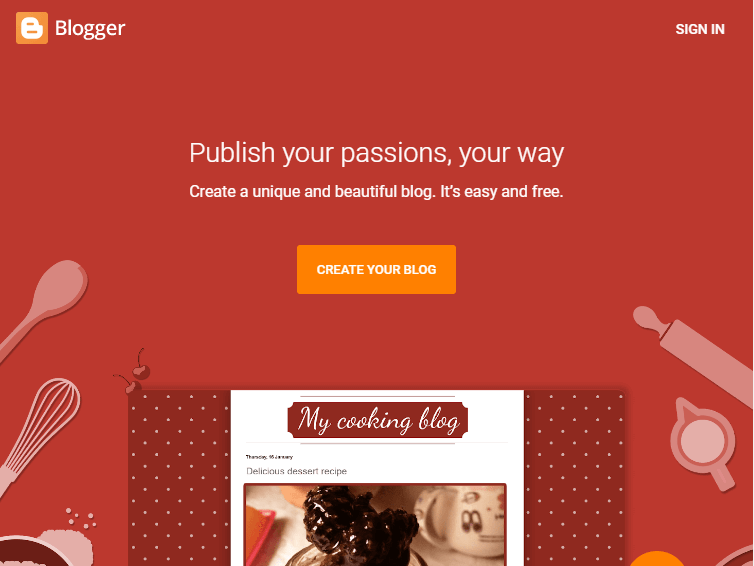
Step 2: As a blogger is integrated with Google, so when we click on create your blog, the following window appears on the screen in which create your account to start a blog.
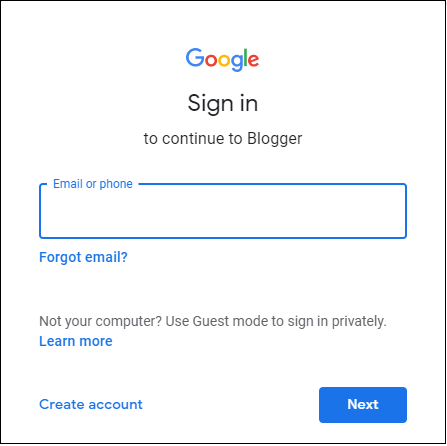
Step 3: The following screen appears on the screen in which enter the name that you want to display and click on the Continue to Blogger.
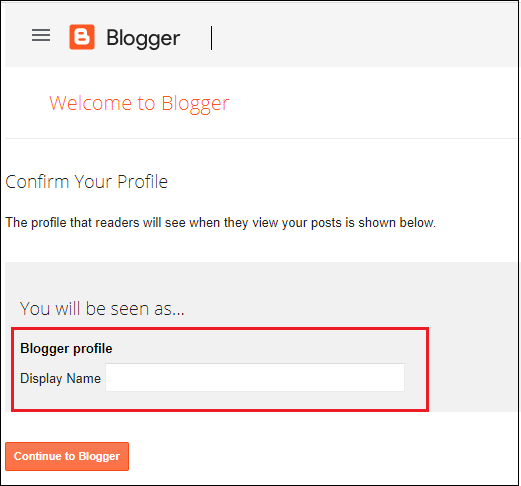
Step 4: Once you click on the Continue to Blogger, the following window appears on the screen. To create the blog, click on create a new blog.
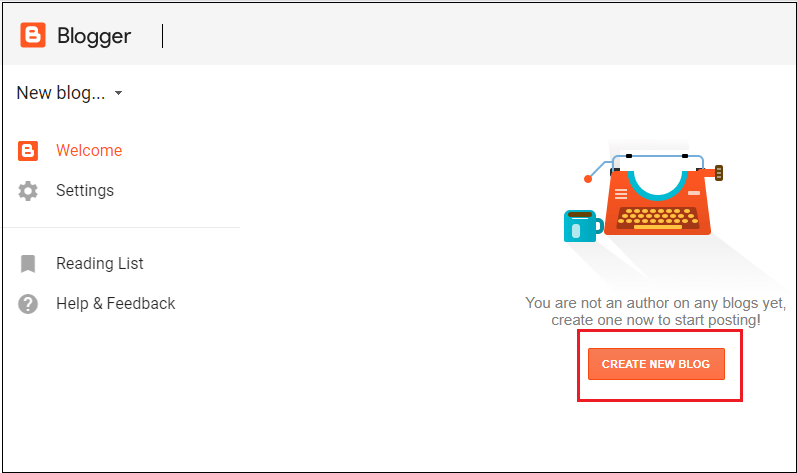
Step 5: The following pop-up appears on the screen in which enter the blog title and address, select the blog theme, then click on the Create blog at the bottom of the screen.
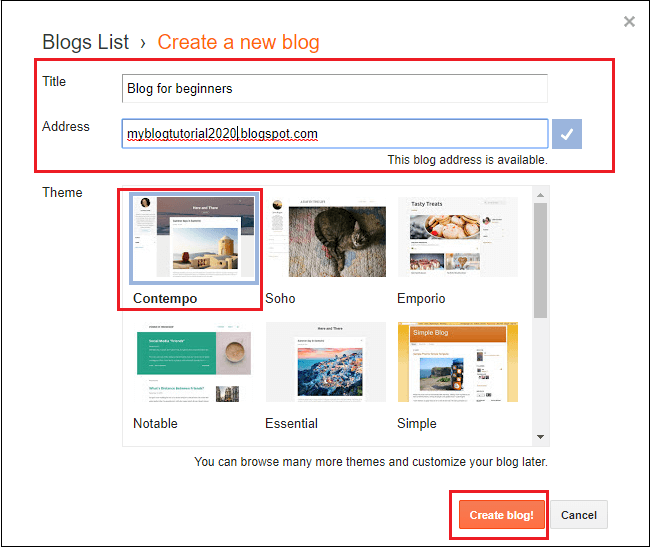
The below screenshot shows that blog is ready to use.
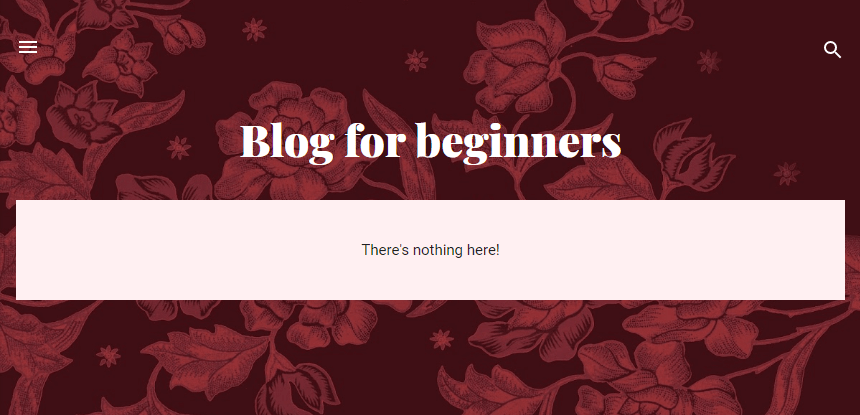
5. Change the theme
Once you create the blog, you can also change its theme and layout.
To change the theme use the below steps -
Step 1: Click on the Theme at the right pane.
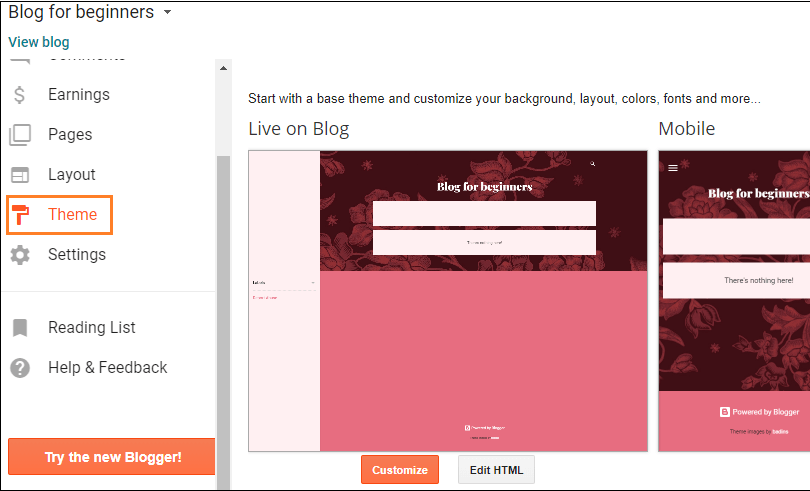
Step 2: Scroll down the window and select the blog theme according to your requirement.
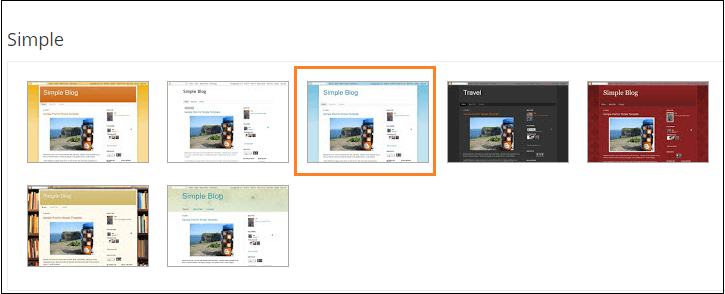
Step 3: Once you select the theme, the following pop-up window appears on the screen, in which click on the Apply to Blog at the bottom of the screen.
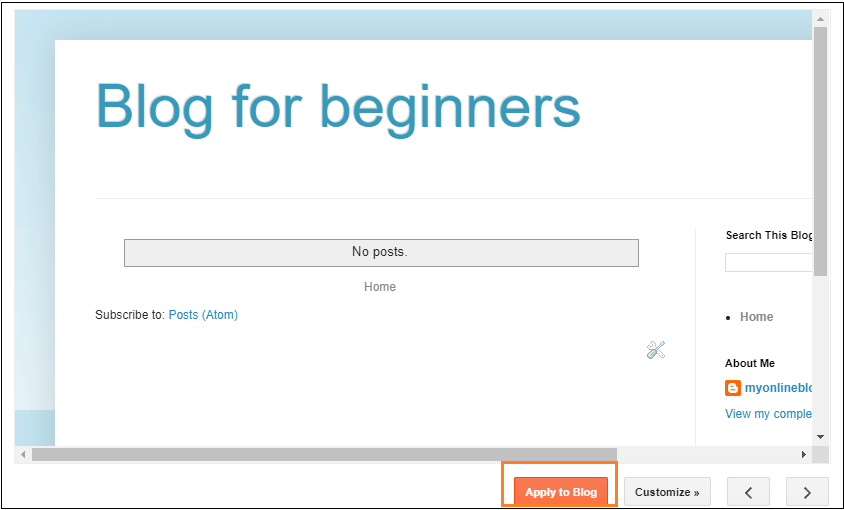
The below screenshot shows that the blog theme changed successfully.
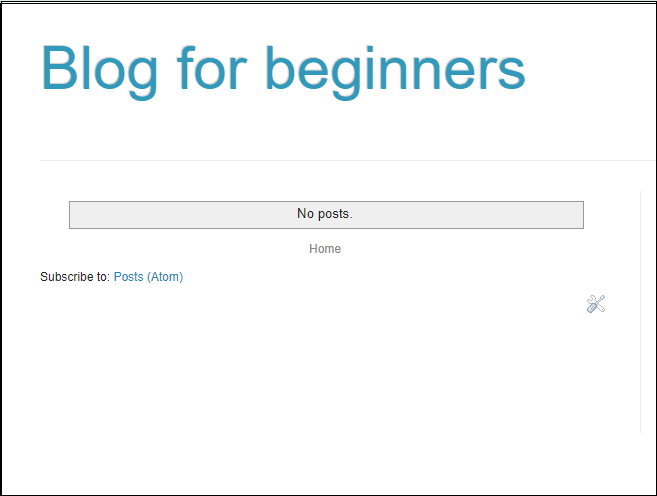
Blogging tools
Blogging tools help us to make our blog post more efficient and useful. Using blogging tools, we can work faster, write better, and generate more traffic on our website.
A list of the most popular blogging tools is given below -
1. Blog writing tools
i. Grammarly
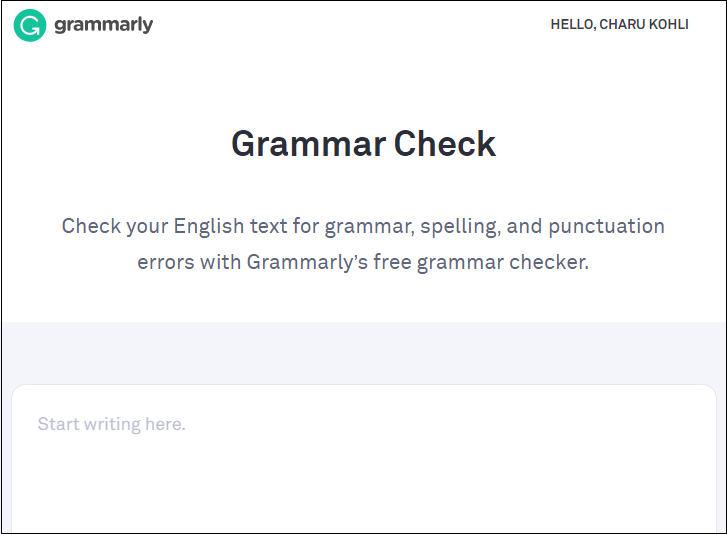
Grammarly is the most important blogging tool. It is a free (paid for more functionalities), and user-friendly tool for bloggers. As the name suggests, it is a Grammar checker tool that helps us to check the grammatical errors in our content.
There are the following operations performed by the Grammarly tool -
- Grammar checking
- Helps us to use proper punctuations
- Helps us to write Error-free blog
- Provides various suggest word which substitutes for quality writing
- Helps us to correct spellings
ii. Evernote
Evernote is available for both free as well as paid versions. It allows us to sync and save record notes, typed notes, and other notes in one convenient place. The advantage of Evernote is that it is available for various platforms such as Windows, MacOS, Android, iOS, Browser, and Unix.
iii. AtomicWriter
AtomicWriter is a brilliant blogging tool. It helps us to construct our blog. It is the best tool for both the beginner writers as well as professional writers. It uses Insights tools to track our content's performance.
ActomicWriter is available in the following formats -
- AtomicWriter Chrome Extension (For Free)
- AtomicWriter WordPress Plugin (For Free)
- AtomicWriter Web App Interface
2. Google Analytics
Google Analytics is the most powerful, valuable, and flexible blogging tool, which is mainly used to measure the traffic of our website. It integrates with various Google's products such as Google Ads, Data Studio, and Search Console.
Google Analytics is used to measure the following -
- How many users visit on your blog every day and every month?
- What is the most visited page of your site?
- How many national and international users take an interest in your blog?
Note: Google Analytics is available for both free as well as a paid version.
3. Google Keyword Planner
Google Keyword Planner is a free blogging tool. It helps us to search keyword based on the words that we used to describe for our website or product category. The advantage of using Google Keyword Planner is that it helps us to increase the website's organic traffic up to 2, 82,762 visits per month.
Google Keyword Planner uses the following three methods to search the keyword -
- By relevant keyword
- By Landing Pages
- By Product Category
4. Email Marketing Tools
Email marketing tools help us to save our time and money to write as well as publish the blog posts.
Some most commonly used Email marketing tools are given below -
- Sender
The sender is the free email marketing tool which helps us to write and publish the content without any technical (HTML, CSS) knowledge.
- ConvertKit
ConvertKitt was founded by Natha Barry, who was a great blogger. It is the best Email marketing platform, which helps us to build a strong relationship with our audience. The main feature of ConvertKit is that it has the ability to edit all our emails on one screen.
- Mailchimp
Mailchimp is used to create a free newsletter. It is founded by Ben Chestnut and Dan Kurzius in 2001. The advantage of Mailchimp is that it is easy to use, reliable, and develops business goals.
5. Search Engine Optimization (SEO) Tools
There are the following Search Engine Optimization (SEO) tools that we use in writing a blog -
- Google Trends
Google Trends is one of the most useful free online search engine tools for the blogger. It allows us to post new trending news, specific keywords, phrases, and subjects. The main feature of using Google Trends is that it can remove those keywords that are less popular on the search engine ranking page.
- BuzzSumo
BuzzSumo provides an essential way to work smarter by ensuring that what topics were trending on the other websites for the last 12 months. It also helps us to analyze top content, find influencers in our space, run social reports, generate alerts, and more.
BuzzSumo contains the flowing four key components -
- Discovery
- Research
- Influencers
- Monitoring
- Yoast SEO
Yoast SEO is the most popular tool for bloggers. It offers various tools that help us to bring our blog posts at the highest rank of Google search engine by optimizing Meta tags and other elements before showing results to the users.
- Google keyword planner
Google keyword planner is a part of the Google AdWords advertising platform. It helps us to find and analyze the list of new keywords and check out the monthly search volume, competition, suggestions, and trends.
6. Image and Graphics Tools
Image and Graphics tools help us to make our blog more attractive by using various types of images, fonts, templates, and more.
There are the following Image and Graphics tools available for the blogger -
1. Adobe Photoshop
It is the best graphic design tool that allows us to create attractive images that make our blog more attractive.
ii. Canva
It is the most widely used online graphic design tool. It is a simple-to-use tool that allows us to use drag and drop tools to create various graphics. The main feature of Canva is that is divided infographics into subcategories such as Business, Education, Charity, and Timeline.
iii. Pixlr
Pixlr is a free, web-based image editing tool that is quite similar to Photoshop. It is very simple and easy to use. It includes features such as tools, layers, borders, fonts, shapes, and more.
iv. PicMonkey
PicMonkey is one of the most powerful photo editing tools. It continuously adds new features, functionality, and various collaboration tools to design blog graphics, social media graphics, announcements, cards, and postcards, edit images, etc.
Note: PicMonkey provides a 7-day free trial offer after that we have to pay $3.33 per month.
7. Landing Page Tools
A list of Landing page tools are given below -
i. Unbounce
Unbounce is the first landing page tool that provides the easiest way to build landing pages. It is a drag and drops editor which offers various features including 100+ box templates, WordPress integration, maps design, A/B testing, etc.
ii. Instapage
Instapage is the most useful tool for bloggers. It easily integrates with Google Analytics, Facebook Advertising, and more. The main feature of Instapage is that it captures leads with forms and send them to Salesforce, Zapier, GetResponse, Mailchimp, and more.
iii. Systeme.io
Systeme.io is one of the best marketing tools, which help us to create a blog, building a mailing list, create sales funnels, online courses, and more. The advantage of Systeme.io is that it is a user-friendly drag and drop tool having the best blogging capabilities and Sales funnel creation ability.
Featured post
Life Infotech now a leading brand in the field of technology training
Life Infotech now a leading brand in the field of technology training & its invites students around the nation to be a part of the Tra...
-
Introduction: This course is designed to aim at imparting a basic level IT Literacy programme for the common man. This programme has esse...
-
12 Techniques to Help You Live a Happy and Fulfilled Life It seems that everything comes in a list format nowadays. “Wash, Rinse, and...
-
Basic network troubleshooting Because of the variety of network hardware, network configurations, operating systems, and setups, not all...



